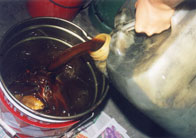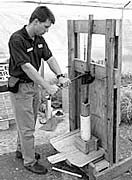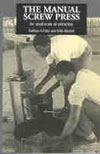![]()
Search the Journey to Forever website – click HERE
Journey to Forever:
Make a donation
En español
Biocombustibles, biodiesel
Contact usTo Keith Addison Handmade Projects |
 New!
New!
The Biodiesel Bible
by Keith Addison, Journey to Forever
This is the only book that thoroughly covers the entire subject of making your own biodiesel – all the information at the Journey to Forever website and very much more.
Learn how to make top-quality biodiesel that will pass all the quality standards requirements every time.
We haven't had a failed batch for 11 years! (But if you do have a failed batch we tell you how to rescue it – and how to improve your processing so it won't happen again.)
Save money! Making your own biodiesel will save you thousands.
Click HERE
New! Build a 3-inch ethanol still – Click HERE
Biodiesel
Make your first test batch of biodiesel
Biodiesel facts
Diesel emissions and cancer
Greenhouse gases and global warming
Energy efficiency
Grow your own
Official
Unofficial
History of biodiesel
Email to Journey to Forever friends, Friday 23 April 1999:
"We turned our kitchen into a sort of illicit still and made a hell of a mess in there brewing biodiesel fuel out of about 60 litres of yukky waste cooking oil we got from behind McDonald's one night (they were happy to give it to us once we told them we didn't want to eat it). We were sure it would work, but we had to try it ourselves first -- we're not chemists, and if we can make it anyone can.
Spanish Spanish-language version HERE. Start here – Follow the instructions, step by step. Forget anything else you've read. Study everything on that page and the next page and at the links in the text. It tells you everything you need to know. It's not just us who say so, it's largely the result of a collaborative effort over 10 years involving thousands of people worldwide, it's what works. Thousands of ordinary people have done this without any other help, and so can you. Do it yourself, you'll be just fine. Biodiesel is made from vegetable oil or animal fat (triglycerides) reacted with methanol or ethanol and a catalyst (lye), yielding biodiesel (fatty acid methyl or ethyl esters) and glycerin as a by-product. See Biodiesel Emissions, the US National Biodiesel Board's summary of biodiesel emissions and potential health effects, according to "the most stringent emissions testing protocols ever required by the US EPA" (Acrobat file, 40 kb): A U.S. Department of Energy study at the University of California at Davis found that using pure biodiesel instead of petro-diesel reduced cancer risks from exhaust emissions by 93.6%. Human-caused global warming is one of the greatest and most urgent challenges facing humanity and life on earth today. According to a comparative life-cycle study by the US Department of Energy's National Renewable Energy Laboratory, biodiesel requires only 0.31 units of fossil energy to make 1 unit of fuel. (Acrobat file, 672 kb) For a range of small-scale oilseed presses see Oilseed presses at our Biofuels supplies and suppliers page. Biodiesel is recognized by both the US Environmental Protection Agency and Department of Energy as an alternative fuel, and qualifies for mandated programs under the Clean Air Act Amendments and the Environmental Protection Act of 1992 (EPAct). In California, biodiesel has been approved for use in remediation of petroleum oil spills. Journey to Forever has been at the forefront of the development of cheap, effective and safe small-scale production methods that produce high-quality fuel and that anyone can use. "An engine that Rudolf Diesel showed at the 1900 World Exhibition in Paris ran on peanut oil..." said The Economist in an article on biofuels. -- Stirrings in the corn fields, May 12th 2005 (288kb pdf):
"And it works! Amazing! Last night we put the stuff in Midori's old diesel Land Rover and it ran like a dream and smelt like a bunch of roses! Well, French fried roses anyway. Now it runs clean, on waste Big Mac residues we brewed up in a bucket in the kitchen, and we're very tickled!"
 Free heating!
Free heating!
Roger Sanders has updated his popular improved version of the Mother Earth News waste oil heater with a great deal of new information and new options.
This waste oil heater solves all the problems that made the original MEN version difficult to use.
Roger's design is simple and reliable -- it's easy to build and easy to use, it's quiet, it uses no electricity, it's easy to light, easy to clean and easy to control, it has a wide heat range, and it runs on waste vegetable oil (WVO) just as well as on used engine oil. It can save you thousands of dollars in heating bills.
The Second Edition is available as a pdf e-book, price $22.50. Complete DIY instructions -- buy it HERE.
Make your first test batch of biodiesel
Biodiesel facts
It can be used in any diesel engine without modifications — diesel engines run better and last longer with biodiesel. And it can easily be made from a common waste product: used cooking oil.
Biodiesel is a much cleaner fuel than conventional fossil-fuel petroleum diesel ("dinodiesel").
Biodiesel can be mixed with petro-diesel in any proportion, with no need for a mixing additive.

The raw material -- used cooking oil.
http://www.biodiesel.org/pdf_files/fuelfactsheets/emissions.pdf
See also A Comprehensive Analysis of Biodiesel Impacts on Exhaust Emissions, US EPA (Acrobat file, 772 kb):
http://www.epa.gov/otaq/models/analysis/biodsl/p02001.pdfDiesel emissions and cancer
The study, Chemical and Bioassay Analyses of Diesel and Biodiesel Particulate Matter, 1996, used a 1995 Dodge 3/4 ton pickup truck with a 5.9-litre Cummins B Turbo diesel and tested 100% biodiesel (ethyl ester of rapeseed oil -- REE), 100% diesel 2-D low-sulfur fuel and blends of 20% REE and 50% REE with the 2-D diesel fuel. In test after test the study found the highest risk came from 100% diesel fuel, followed by the 20% REE blend, the 50% REE blend and, lowest risk, the pure biodiesel.
"Use of the 100% REE fuel produced the lowest genotoxic (DNA-damaging) activity in the tests. Blended fuels in the non-catalyst-equipped engine produced less emissions than the 100% diesel fuel... The use of the 100% REE fuel resulted in the lowest emissions compared to the REE blends and 100% diesel fuels.
"The highest relative specific mass mutagenic activity collected during either the hot or cold test cycles was the particulate matter collected from the 100% diesel fuel emissions... The lowest relative specific mass mutagenic activity was from the particulate matter collected from emissions of l00% REE fuel."
NOTE: There's nothing special about ethyl ester of rapeseed oil biodiesel, other types of biodiesel have similar characteristics.
Chemical and Bioassay Analyses of Diesel and Biodiesel Particulate Matter: Pilot Study -- Final Report by Norman Y. Kado, Robert A. Okamoto and Paul A. Kuzmicky, Department of Environmental Toxicology, University of California, Davis, California, November 1996. Acrobat file, 3.1Mb.
UC Davis biodiesel study -- summary: the Summary, Results and Discussion sections of the report, in html format.Greenhouse gases and global warming
The main culprit is the enormous amount of the potent greenhouse gas carbon dioxide (CO2) released into the atmosphere by the burning of fossil fuels (petroleum, coal, natural gas).
Burning fossil fuels releases more than 6 billion tons of CO2 per year, twice as much as the biosphere can absorb. The excess CO2 is clogging the atmosphere, with the result that less solar heat is reflected away, more heat reaches the earth's surface, and global temperatures rise.
Using vegetable oils or animal fats as fuel for motor vehicles is in effect running them on solar energy.
All biofuels (including fuel ethanol) depend on the conversion of sunlight to energy (carbohydrates) that takes place in the green leaves of plants.
Plants use water and CO2 from the atmosphere as the raw materials for making carbohydrates. Burning plant (or animal) products in an engine releases the CO2 back into the atmosphere, to be taken up again by other plants. The CO2 is recycled.
Natural mechanisms work to hold the amount of CO2 in the atmosphere at a stable level, maintaining a balance between the CO2 removed from the atmosphere to be "fixed" into growing organic matter and the CO2 released back into the atmosphere when the organic matter burns or dies and decays. The net amount of CO2 in the atmosphere stays the same.
Activities that don't disrupt this balance are described as carbon-neutral.
In fact, there's no actual reduction in the amount of CO2 produced when biodiesel is burned instead of petro-diesel -- the same amount of CO2 will come out of the exhaust pipe with either fuel.
But the CO2 released by burning biodiesel is part of the current natural cycle, it does not raise the level of CO2 in the atmosphere and does not act as a greenhouse gas. Biodiesel is carbon-neutral and does not increase global warming.
Petro-diesel is not carbon-neutral. Burning petro-diesel unleashes CO2 that has been trapped deep in the earth for millions of years, upsetting the natural balance and raising the level of CO2 in the atmosphere, causing global temperatures to rise. Fossil-fuel CO2 is an active greenhouse gas.
In practice however, not all biodiesel is carbon-neutral. It depends how it's produced. "Life-cycle" studies of the whole production process from sowing the seed to filling the fuel tank can show a different picture.
Industrialised agricultural production of oil crops like soy or rapeseed depends heavily on fossil-fuel inputs which must be included in the equation, and biodiesel made from these crops is not carbon-neutral. But petro-diesel is a lot worse.
Organic farms don't use fossil-fuel-based chemical fertilizers and their fossil-fuel inputs are much lower, shrinking to zero when they produce their own fuel and energy on-farm, as a growing number of organic farmers are doing. Biodiesel produced this way is carbon-neutral or very close to it.
Biodiesel made from used cooking oil (WVO -- waste vegetable oil) should also qualify. Most WVO ends up in the sewers and landfills where it does no good and doesn't offset any fossil-fuel use. Converting it to biodiesel is a much better option, a social service. Reduce, reuse, recycle.
The US produces at least 1.1 billion gallons a year of used cooking oil (details), and most of it goes to waste.
By comparison, US commercial production of biodiesel in 2006 was only 250 million gallons, most of it made from new soy oil, very little from used oil.
Biodiesel homebrewers, small-scale local projects and local coops nearly always use WVO, seldom new oil. This is truly "green" fuel.
Global Warming Myths and Facts -- Environmental Defense Fund
http://www.edf.org/page.cfm?tagID=1011
The Latest Myths and Facts on Global Warming -- In-depth scientific report by Dr. James Wang and Dr. Michael Oppenheimer, Environmental Defense Fund -- 30 pages, 388 kb pdf:
http://www.edf.org/documents/4418_MythsvFacts_05.pdf
Joint science academies' statement: Global response to climate change -- "Climate change is real": 2-page report signed by the Academia Brasiliera de Ciências, Brazil; Royal Society of Canada; Chinese Academy of Sciences; Academié des Sciences, France; Deutsche Akademie der Naturforscher, Germany; Indian National Science Academy; Accademia dei Lincei, Italy; Science Council of Japan; Russian Academy of Sciences; Royal Society, UK; National Academy of Sciences, USA. 392 kb pdf:
http://nationalacademies.org/onpi/06072005.pdf
World carbon dioxide levels highest for 650,000 years, says US report, by David Adam, environment correspondent, The Guardian, May 13, 2008
http://www.guardian.co.uk/environment/
2008/may/13/carbonemissions.climatechange
Carbon dioxide emissions accelerating rapidly, Earth Policy Institute, April 9, 2008
http://www.precaution.org/lib/08/prn_co2_emissions_
accelerating.080410.htm
Energy efficiency
An Overview of Biodiesel and Petroleum Diesel Life Cycles
http://www.nrel.gov/vehiclesandfuels/npbf/pdfs/24772.pdf
"By contrast, it takes 1.2 units of fossil resources to produce 1 unit of petroleum diesel," the study says.
We wonder what the true energy efficiency figures for biodiesel would be if fossil fuels were eliminated from the equation and the entire production process powered by biofuels produced on the farm, from planting the seeds to filling the tank. If it's an organic farm the fossil-fuel based chemical fertilizers are eliminated as well. And why waste energy trucking energy crops to a distant large-scale central processing unit and then waste even more energy trucking the finished fuel all the way back again, instead of processing it and using it right there where it was grown?Grow your own
Rapeseed (Brassica napus), or canola, produces about 2,000 pounds of seed per acre, yielding about 100 gallons of vegetable oil for fuel, as well as 1,200 pounds of high-protein meal (seedcake) which can be used for livestock feed, or composted, or added to a biogas digester to produce methane for cooking and heating, or used to make ethanol.
Yields from soybeans are about 60 gallons per acre, from coconuts more than 200 gallons per acre, and from oil palms more than 500 gallons per acre. (See Vegetable oil yields.)
On the small scale, one bushel of rapeseed (canola) produces about 3 gallons of biodiesel.
The Sunflower Seed Huller and Oil Press -- by Jeff Cox (from Organic Gardening, April 1979, Rodale Press): Vegetable oils used to be one of those items you just HAD to buy. Now here's how to make your own. In 2,500 square feet, a family of four can grow each year enough sunflower seed to produce three gallons of homemade vegetable oil suitable for salads or cooking and 20 pounds of nutritious, dehulled seed -- with enough broken seeds left over to feed a winter's worth of birds. Online at the Journey to Forever Biofuels Library.
 Briquette Presses for Alternate Fuel Use, by Jason Dahlman with Charlie Forst, 2001 -- Design for a simple briquette press that can also be used as an oil press for seeds. Acrobat file, 2.8Mb
Briquette Presses for Alternate Fuel Use, by Jason Dahlman with Charlie Forst, 2001 -- Design for a simple briquette press that can also be used as an oil press for seeds. Acrobat file, 2.8Mb
http://www.echotech.org/technical/
technotes/Briquete.pdf
 "The Manual Screw Press for Small-Scale Oil Extraction" by Kathryn H. Potts, Keith MacHell, 1993, Practical Action, ISBN 1853391980
"The Manual Screw Press for Small-Scale Oil Extraction" by Kathryn H. Potts, Keith MacHell, 1993, Practical Action, ISBN 1853391980
Manual oil extraction from peanuts or other soft oilseeds can be a viable enterprise for small businesses. Describes small-scale processes of oil extraction for use in rural areas, as well as ways to market and distribute the oilcake. Buy at Amazon.com: The Manual Screw Press for Small-Scale Oil Extraction
 "Small-scale Vegetable Oil Extraction", S W Head, A A Swetman, T W Hammonds, A Gordon, K H Southwell and R V Harris, Natural Resources Institute, 1994, ISBN 0 85954 387-0 -- Covers a basic understanding of the science and composition of oils and economic and marketing considerations, principles of oil extraction, basic oilseed processing methods, the major oil sources with specific small and intermediate technologies for each. Results from actual third world situations are used. For example, the discussion of obtaining oil from sesame seed covers a hot water flotation method used in Uganda and Sudan, the bridge press (laboratory only), the ram press in Tanzania, the ghani process in Sudan, and a small-scale expeller in the Gambia. Technical details for each are summarized in a few paragraphs, including oil yields. Includes many drawings that are helpful in understanding each process, with a 14-page appendix listing suppliers of small-scale equipment. Coconuts, groundnuts, oil palm, palm kernels, rapeseed/mustard seed, sesame, shea nuts, soya, sunflower seed, minor oilseeds (reference list). Complete book free online at CD3WD 3rd World Development online library: http://www.cd3wd.com/cd3wd_40/cd3wd/
"Small-scale Vegetable Oil Extraction", S W Head, A A Swetman, T W Hammonds, A Gordon, K H Southwell and R V Harris, Natural Resources Institute, 1994, ISBN 0 85954 387-0 -- Covers a basic understanding of the science and composition of oils and economic and marketing considerations, principles of oil extraction, basic oilseed processing methods, the major oil sources with specific small and intermediate technologies for each. Results from actual third world situations are used. For example, the discussion of obtaining oil from sesame seed covers a hot water flotation method used in Uganda and Sudan, the bridge press (laboratory only), the ram press in Tanzania, the ghani process in Sudan, and a small-scale expeller in the Gambia. Technical details for each are summarized in a few paragraphs, including oil yields. Includes many drawings that are helpful in understanding each process, with a 14-page appendix listing suppliers of small-scale equipment. Coconuts, groundnuts, oil palm, palm kernels, rapeseed/mustard seed, sesame, shea nuts, soya, sunflower seed, minor oilseeds (reference list). Complete book free online at CD3WD 3rd World Development online library: http://www.cd3wd.com/cd3wd_40/cd3wd/
foodproc/nr18se/en/b981.htm
 Oil Extraction, Food Cycle Technology Source Book No. 1, Intermediate Technology Development Group, United Nations Development Fund for Women (UNIFEM), 1987. Raw materials, traditional extraction methods, improved technologies, Appropriate Technology approach for 3rd World countries, illustrated, focus on opportunities for women. Download free from the CD3WD online 3rd World library (5.8Mb pdf):
Oil Extraction, Food Cycle Technology Source Book No. 1, Intermediate Technology Development Group, United Nations Development Fund for Women (UNIFEM), 1987. Raw materials, traditional extraction methods, improved technologies, Appropriate Technology approach for 3rd World countries, illustrated, focus on opportunities for women. Download free from the CD3WD online 3rd World library (5.8Mb pdf):
http://www.fastonline.org/CD3WD_40/JF/417/06-298.pdf
Understanding Pressure Extraction of Vegetable Oils, VITA Technical Paper #40, by VITA Volunteers James William Casten and Harry E. Snyder. Full text online at CD3WD 3rd World Development online library:
http://www.cd3wd.com/cd3wd_40/vita/vegoilex/en/vegoilex.htm
Understanding Solvent Extraction of Vegetable Oils, VITA Technical Paper # 41, by VITA Volunteer Nathan Kessler. Full text online at CD3WD 3rd World Development online library:
http://www.cd3wd.com/cd3wd_40/vita/vegoilse/en/vegoilse.htm
Small-Scale Oil Extraction from Groundnuts and Copra (ILO - WEP, 1983, 128 p.), full text online at CD3WD 3rd World Development online library:
http://www.cd3wd.com/cd3wd_40/
cd3wd/foodproc/h2384e/en/b989.htm
"Small-scale Oilseed Processing" by Janet Bachmann, NCAT Agriculture Specialist, Appropriate Technology Transfer for Rural Areas (ATTRA) -- Basic processes involved in small-scale oilseed processing, includes a low-tech method for raw material preparation using sunflower seeds as an example; information on methods and equipment used for oil extraction; notes on clarification, packaging, and storage. Sources for additional information and a list of suitable raw material.
http://www.attra.org/attra-pub/oilseed.htmlOfficial
US Department of Energy approval: "Vehicle fleets currently required to purchase light duty alternative fueled vehicles under the Energy Policy Act of 1992 will be now allowed to purchase biodiesel fuel as an alternative, according to the U.S. Department of Energy. [Then-]Secretary of Energy Spencer Abraham has approved a final rule allowing biodiesel fuel to qualify as an alternative fuel for automobile fleets under the Energy Policy Act." -- U.S. Department of Energy, April 30, 2001. "The continued use of biomass products like biodiesel in our vehicle fleets, for power generation and for other products and materials will help the environment and help diversify our energy resources," said Abraham.
USDA Clears Air with Biodiesel: Buses and other diesel-burning vehicles run cleaner if they mix biodiesel with regular diesel fuel, said the US Department of Agriculture at a biodiesel fuel seminar at a USDA research center. "The program is part of a federal effort to reduce reliance on petroleum and create new markets for US crops," said Floyd P. Horn, administrator of the Agricultural Research Service, USDA's chief scientific agency. "Crop-based diesel burns cleaner, less sooty. One of our goals is to increase the federal government's purchases of bio-based fuel and other products by 10% per year over the next 5 years. We want to encourage the private sector and local governments to do the same." (January 13, 2000)
http://www.ars.usda.gov/is/pr/2000/000113.htm
Europe leads the way in biodiesel production and consumption. Germany has more than 1,900 filling stations selling biodiesel at the pump. France is the world's largest producer: all French diesel fuel contains between 2% and 5% biodiesel, and that will soon apply to the whole of Europe, and to other countries.
Meanwhile biodiesel production in the US is growing rapidly, from only half a million gallons in 2000 to 250 million gallons in 2006, with more than 80 new large-scale plants due to come online in 2008.
China, India and Brazil are rapidly becoming major producers and many other countries are following. One report forecast that by the year 2020 as much as 20% of all on-road diesel fuel used in Europe, Brazil, China and India could be biodiesel. Unofficial
Worldwide, many thousands of small, independent, local operations are now producing and using millions and millions of gallons of biodiesel a year, with millions of dollars in petro-diesel sales lost to ExxonMobil & Co.
Most of it goes right under the official radar. Nobody has any clear idea of quite who these people are or how much fuel they produce, mainly because the individual quantities are so small it's considered insignificant. But the grassroots biodiesel movement is growing fast and spreading like a weed, it's suitably out of control.
And it's not destroying rainforests and forcing up food prices so poor people can't afford to eat. It's industrialised "agrofuels" production that does that -- true biofuels production is small-scale, local, eco-friendly and sustainable.
"Small is beautifuel." (Prof. Pagandai Pannirselvam, Brazil.)History of biodiesel
http://www.greenfuels.org/biodiesel/economist120505.pdf
George Monbiot said the same thing in The Guardian: "This, in fact, was how Rudolf Diesel expected his invention to be used. When he demonstrated his engine at the World Exhibition in 1900, he ran it on peanut oil." -- "Fuel for nought", November 23, 2004
http://www.guardian.co.uk/comment/story/0,,1357370,00.html
The US National Biodiesel Board (NBB) says Diesel "originally designed the diesel engine in the late 19th Century to run on peanut oil."
http://www.biodiesel.org/
Almost every website on biodiesel or Straight Vegetable Oil fuel says the same, along with The Washington Post and The New York Times, which said Diesel had "demonstrated a tractor that chugged along on peanut oil".
But he didn't do it, it wasn't him. (And there wasn't any tractor.)
Vegetable oil rated only a few lines in Diesel's book "The Development of the Diesel Engine", which he wrote in 1913. He says it was not him but the French Otto Company that ran one of his engines on peanut oil at the 1900 Paris World Fair, at the request of the French government.
"The engine was built for crude oil and was used without any modification on peanut oil. ... it ran so smoothly that only a few insiders were aware of it," Diesel wrote.
Diesel said the work had not been continued in France, but he'd started trials with peanut oil himself a few months previously, and provided some figures on fuel consumption and power. Similar successful experiments had also been made in St. Petersburg with castor oil, he said.
"This oil is almost as effective as the natural mineral oils, and as it can also be used for lubricating oil, the whole work can be carried out with a single kind of oil produced directly on the spot. Thus this engine becomes a really independent engine for the tropics," he wrote.
"The use of vegetable oils for engine fuels may seem insignificant today but such oils may become, in the course of time, as important as petroleum and the coal-tar products of the present time.
"In any case, they make it certain that motor power can still be produced from the heat of the sun, which is always available for agricultural purposes, even when all our natural stores of solid and liquid fuels are exhausted." (Diesel, Rudolf. 1913. "Die Entstehung des Dieselmotors" 1st reprint by Braun, Hans-Joachim (Ed). 1984. Moers: Steiger. Page 115.)
Very prophetic -- it's nearly a hundred years later, and a lot of people are seeing it that way now.
Modern research and development of biodiesel fuel started in South Africa (which was under an oil embargo at the time), and in Austria (which bought South Africa's research).
The idea that ordinary people could make it in their kitchens came a little later.
The man who started the do-it-yourself biodiesel movement, Dr. Thomas B. Reed, relates how he got the idea of making biodiesel from waste cooking oil ("McDiesel") in 1989, and tells you how to do it. This was the only information we had when we started making biodiesel. Now there are better ways of doing it, but it's all thanks to Tom Reed. See McDiesel Also see Tom's Biomass Energy Foundation site:
http://www.woodgas.com/
 Fat of The Land -- In 1994 four women from the California Bay Area travelled 3,000 miles around the US on biodiesel in their Fat Mobile diesel van on an educational tour. They made their biodiesel as they went along, usually in the parking lots of fast-food restaurants, and filmed a groundbreaking video documentary while they were at it.
Fat of The Land -- In 1994 four women from the California Bay Area travelled 3,000 miles around the US on biodiesel in their Fat Mobile diesel van on an educational tour. They made their biodiesel as they went along, usually in the parking lots of fast-food restaurants, and filmed a groundbreaking video documentary while they were at it.
http://www.lardcar.com/lardcar1.html
Today, anyone can learn how to make their own top-quality biodiesel, safely, reliably and cheaply. Start here: Where do I start? Follow the instructions, step by step. It tells you everything you need to know.
Biofuels
En español -- Biocombustibles, biodiesel
Biofuels Library
Biofuels supplies and suppliers
Biodiesel
Make your own biodiesel
Mike Pelly's recipe
Two-stage biodiesel process
FOOLPROOF biodiesel process
Biodiesel processors
Biodiesel in Hong Kong
Nitrogen Oxide emissions
Glycerine
Biodiesel resources on the Web
Do diesels have a future?
Vegetable oil yields and characteristics
Washing
Biodiesel and your vehicle
Food or fuel?
Straight vegetable oil as diesel fuel
Ethanol
Ethanol resources on the Web
Is ethanol energy-efficient?
